Many difficult issues have been raised by the publication of cartoons lampooning the Prophet Muhammad by a Danish newspaper — as well as by the violent reactions to it. But for all who worry about how fallout from the controversy will affect free speech, one question stands out:
Does freedom of expression include the right to offend deeply held religious convictions?
This question is, of course, the subject of a long-simmering debate in Europe and the United States between those who advocate full-throated freedom of speech and those who push for bans on “hate speech” that offends racial, ethnic or religious sensibilities. When a crisis hits — especially one that precipitates violence — the free-speech argument often loses ground.
Consider the statement from the Vatican last week deploring the violent reactions to the cartoons, but going on to declare that “freedom of thought or expression … cannot imply a right to offend the religious sentiments of believers” no matter what the religion. According to the Catholic News Service, the Vatican believes that where free speech crosses the line and becomes offensive to religion, national authorities “can and should” intervene.
The Vatican is not alone. Although European governments have been careful to couple statements criticizing the cartoons with noble pronouncements about support for freedom of expression, their track record on protecting those freedoms is decidedly mixed. Long before the cartoon controversy, the pattern in much of Europe has been to invoke “hate speech” laws to prosecute “offensive” speech.
Denmark, ground zero for the cartoon conflict, has a blasphemy statute that calls for a fine and up to four months in prison for demeaning a “recognized religious community.” Writing on Salon.com, Jytte Klausen describes the case of Mogens Glistrup, “a tax protester turned xenophobe” who was “imprisoned for 20 days last year for a racist speech. He compared Turks to rabbits.”
It remains to be seen if the Muhammad cartoons will be prosecuted as “racist speech” in Denmark, but other verbal and written attacks on Muslims have triggered legal action in a number of European nations. According to the Christian Science Monitor, British prosecutors are preparing a case against leaders of the right-wing British National Party based on speeches in which one called Islam a “wicked” faith. And in Italy, author Oriana Fallaci faces trial later this year on charges that she slandered Muslims in her book The Strength of Reason.
In the United States, thanks to the First Amendment, the government can’t restrict speech because it is sacrilegious, blasphemous or just plain offensive. But that doesn’t stop people from trying. From the left, we get “speech codes” on college campuses banning speech that might offend racial, ethnic or religious groups. And from the right, we have efforts to yank government funding from museums displaying art that religious groups find demeaning.
Censoring speech offensive to religion, it turns out, is a popular idea in the land of the free. In a poll taken by the First Amendment Center in 2004, nearly half of Americans don’t think people “should be allowed to say things in public that might be offensive to religious groups.”
But before traditionalist believers in Europe or the U.S. get too excited about the prospect of banning blasphemy, they should keep in mind that government censorship of speech they don’t like will likely mean censorship of speech they support. A Swedish pastor was recently taken to court for preaching against homosexuality. Although he was acquitted, his trial won’t be the last in Sweden or in other nations where governments are given the power to define the “hate” in hate speech.
With all due respect to the Vatican, freedom of religion does not mean freedom from offense. On the contrary, full religious liberty is only possible in a society committed to freedom of expression. Throughout history, much of what has been said and written in the name of one religion offends people of other faiths — or of no faith. If offending “religious sentiments of believers” became the standard, we could no longer publish the writings of Martin Luther, Voltaire or countless other authors whose works take sides in matters of religion. What is truth to some is blasphemy to others.
The right to offend is, in fact, at the heart of religious freedom in America. The landmark case defining the free exercise of religion in the United States, Cantwell v. Connecticut (1940), was all about the right of one faith to offend another. Jesse Cantwell, a Jehovah’s Witness, was convicted of a crime because he played a phonograph record on the street that offended two Catholic men (the record had some especially nasty things to say about the Roman Catholic Church).
The U.S. Supreme Court overturned Cantwell’s conviction, ruling that religious liberty and free speech protect the right to offend. Writing for the Court, Justice Owen J. Roberts put the issue this way:
“In the realm of religious faith, and in that of political belief, sharp differences arise. In both fields the tenets of one man may seem the rankest error to his neighbor. To persuade others to his own point of view, the pleader, as we know, at times, resorts to exaggeration, to vilification … . But the people of this nation have ordained in the light of history, that, in spite of the probability of excesses and abuses, these liberties are, in the long view, essential to enlightened opinion and right conduct on the part of citizens of a democracy.”
Justice Roberts had it right. It is always messy and often painful, but only a society that protects the right of all voices to be heard — however offensive or unpopular — can call itself a free nation.
For more information on this and similar topics, visit the First Amendment Center Online





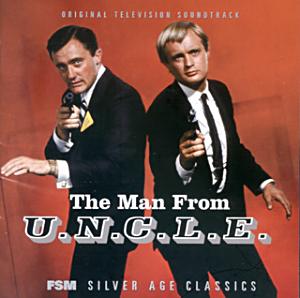



 I love interesting animal stories and this is a doozy...leading to the rewriting of the mammal history!
I love interesting animal stories and this is a doozy...leading to the rewriting of the mammal history! Wednesday, March 1, will be Ash Wednesday. Many local churches will be having services both during the lunch hour and in the evening to commemorate the beginning of Lent.
Wednesday, March 1, will be Ash Wednesday. Many local churches will be having services both during the lunch hour and in the evening to commemorate the beginning of Lent.


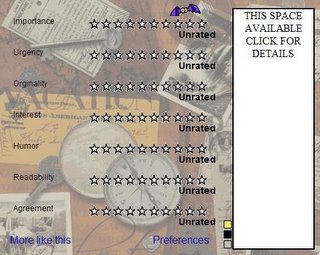






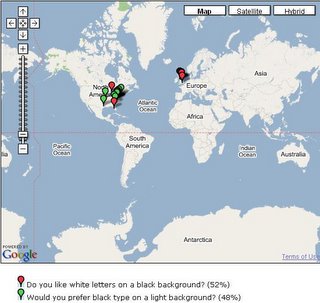






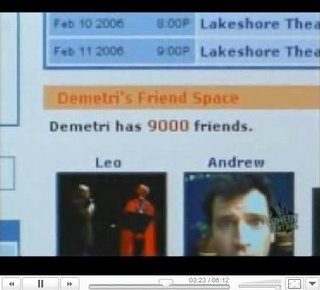
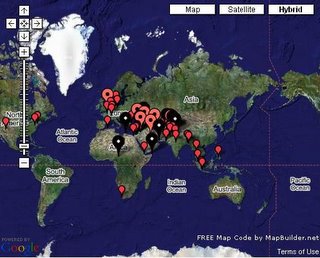























Jeff,
You forgot freeze dried ice cream and shampoo that can be used without water!
I think absolutely that we should spend more money on space exploration. However, I am not sure NASA and the government are the best ones to handle the funding though. I believe it is time for privatization of this important field. The government could help with incentives and cash prizes (decent ones) for inventors.
I think the rewards of space exploration is well worth the expense. If nothing else to know when that meteor is going to strike us.